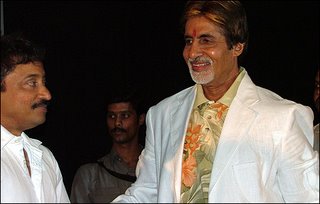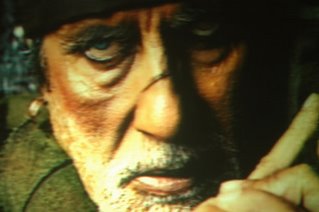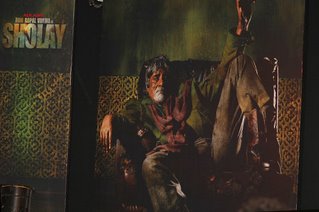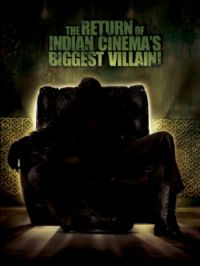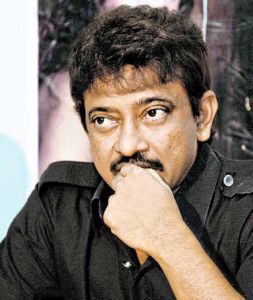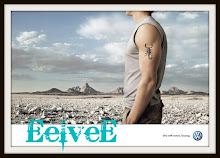Ram Gopal Varma, Unplugged -- Part I

Ram Gopal Varma, Unplugged -- Part I
Raja Sen | November 10, 2004
When rediff.com met Ram Gopal Varma for what was slated as a brief interview, the maverick director started things off with a simple, ice-breaking "Just call me Ramu." Then, unexpectedly, a tremendous conversation unravelled as the filmmaker vocally let fly.
Here's the first in a short series of interviews with Raja Sen, which we will simply call Ramu Unplugged.
What about Naach should we watch out for?
Naach I would describe as an intense love story. We're used to seeing very light-hearted romances, and bubbly affairs, with family functions and Karva Chauts and birthday parties. Naach doesn't have any of the traditional, conventional ingredients of a love story.
It's about two very strong, very independent-minded people: the characterisations are larger than life, designed to intimidate the audience, so they warm up to them. The emotions work on a higher plane than what one is usually used to seeing in such films. This is as far as the subject matter, in terms of the idea, is concerned.
As for the treatment: I have done, as a director, some extremely radical work in terms of taking shots and the sound design, the background score. Also, in terms of performance styles -- very unrehearsed, which is what my intention was.
It's understandably obvious, when I was making Company, of the underworld genre, people would compare it to Satya. While making Naach people will naturally compare it to Rangeela, the only love story I've made. But the difference, primarily, is that Rangeela was a light-hearted entertainer, the characters were very identifiable...
It was a fairy tale: very unrealistic, very filmi.
Correct. It was very filmi. But Naach is radically opposite, in that sense. More like the realistic cinema that Hrishikesh Mukherjee used to make. Like Abhimaan: They were raw; they were real, those characters. I think it's a very contemporary version of that kind of cinema. But packaged very stylishly, with a lot of sleekness, with what is available today for contemporary filmmakers.
Your first experience with Abhishek. I've heard you describe him in glowing terms earlier. So how is it working with him?
I think Abhishek is a terrific actor. In fact, he quite took even me by surprise. I haven't seen any of his films. I saw some portions of Main Prem Ki Diwani Hoon -- I just liked his demeanor, I liked the fact that he had some dignity.
It's quite unreal -- you watching Main Prem Ki Diwani Hoon and then casting Abhishek based on it!
(Bursts out laughing) It's true, I assure you. I just thought, in a film that was, by nature, so boisterous and loud -- I just liked the way he was standing there, doing nothing. There was something about it; it worked for me.
I just came out during the interval, called him and said 'I want to make a film, I want to make a love story with you' (laughs). Amitji grew on us over the years: Deewar, Zanjeer, and all that. Abhishek didn't have a choice -- he was already Amitabh Bachchan's son. At the time Abhishek came into the industry, the whole industry was geared towards making these NRI romances; they were the most successful films.
Even Hrithik, with his dance and his body and all that. I think they tried to force-fit Abhishek into that mould, which is not his natural self. The only thing I did was I put him as Abhishek: just do what you want to do. That is the only thing I tried to do in Naach, and so I think he found his bearings there, and he's turned out a fantastic performance.
Antara, of course, is a favourite of yours. You seem to go through these phases with your heroines, almost like muses. Or maybe, less idealistically, its just a comfort-level thing.
No, I wouldn't even say that. When I believe in an actor, I believe there is something in that actor. See, I don't believe in Fridays, I don't believe in the box office. The industry has a standard way of judging actors: they do ten films, they get X price, and they get this number of awards, seen at page three parties and all that -- that is how they measure success. I don't do it like that.
I just look for what is there in a person, and if that person can work in some film, cannot work in some film. I, as a maker, will know exactly what is it that worked, and what didn't work.
Right from Mast onwards, I believed there was something in that girl, a highly talented person. So in Company I explored another facet of it. In terms of her dedication and her passion, and the amount of work she'll put in for a role is something I've not ever seen in anybody.
The role she's playing in Naach demands that kind of effort. I don't think it's about the comfort level alone. Especially, as far as Naach is concerned, I can't imagine anyone except Antara playing that role.
One thing about your films is your plots have always been very simplistic -- very A-to-B plotlines, but you take a lot more interest in the screenplay -- the characters are a lot more fleshed out, it's all about the screenplay, the dialogues and things like that. Is there a particular reason to this? Don't you want to tell a bizarrely unique story?
I somehow don't believe films are about stories. Films create an effect, an emotional experience that forms what you take home. In fact, looking back from the day I was watching films, I don't remember any of the stories of the films. I just remember shots, I remember moments, I remember songs, I remember a dialogue somewhere.
Now, take the greatest Amitabh Bachchan films: I don't remember a single story from the films. I don't think anyone else would either. If I asked you what is the story of Amar Akbar Anthony, you won't be able to tell me.
The emphasis on 'story' is basically highly exaggerated. Because I think the primary purpose of the story is to abet and make the next moment work. I'll give you an example: Take the biggest hit of all time, Sholay. It's about a guy who hires these two guys to take revenge on a man who massacred his family so brutally -- this is the plotline of Sholay. The story demands you to hate the villain, and the audience comes out loving him. Which means the story had failed, technically, the story has not worked.
But that is the same story which gave rise to those unforgettable moments, from 'kitne aadmi the?' to Helen's Mehbooba song to Dharmendra-Amitabh Bachchan's comedy track -- everything you remember from Sholay is a selection of great, but isolated moments. It's not as if you're emotionally connected with the script of Sholay. If you were, you wouldn't have loved Gabbar Singh (laughs). That's my ultimate proof of what it's about!











